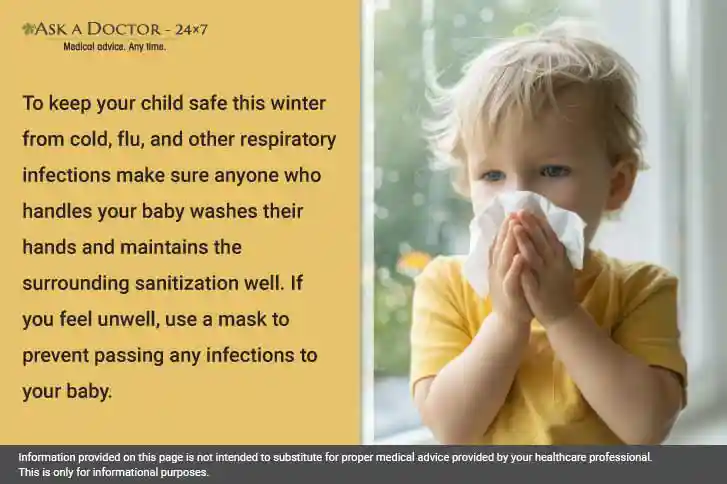7 Winter Care Tips For Your Baby
The cold is harsher for the babies, increasing the risk of seasonal cold, flu, and infection especially if it’s their first winter. Newborn babies have the potential to become weak and ill regularly due to temperature changes. As a result, it becomes imperative that parents look after their newborns and make sure they are safe. Cold weather can easily damage your baby's sensitive skin, causing it to become dry, red, or irritated.
Follow these easy winter care guidelines every day to prevent this from happening. Let’s check out some simple tips and advice that can go a long way for a healthy winter.
7 Winter Care Tips For Your Baby’s Delicate Skin

The common cold, flu, and respiratory syncytial virus (RSV) are among the viral diseases that babies are especially susceptible to during winter. Symptoms of these illnesses may include fever, coughing, runny nose, and breathlessness. Keeping your infant warm is essential for preventing these diseases and taking good care of their soft skin.
Let’s look into the essential baby care tips this winter:
1) Dress your baby in layers
Layering your baby's clothing is an excellent approach to dealing with harsh winters. Keeping babies warm during cold weather is crucial since they lose heat far more quickly than adults. It's also critical to prevent overheating, you can remove a layer or two if your child feels warm. Investing in good quality blankets and keeping the baby’s hands and feet covered is good.
Taking your infant outside during the winter is one of the most important things to consider. Spending time outdoors with your child in the vast outdoors is wonderful, but there are some things to remember. The following are essential guidelines to adhere to when venturing outdoors:
- Check the temperature and clothe your infant appropriately before leaving the house.
- Layer your infant in outfits including a warmer, woolen onesie or sleep suit, trousers, mittens and socks, jacket, and so forth to keep them warm.
- Cover their heads, ears, hands, and small feet when they are outside. You can also wrap a blanket to keep your infant warm and protected from chilly weather.
- Use a baby carrier to carry your infant so that the heat from your body will keep them warm.
2) Keep those pink lips and plump cheeks safe
You will frequently observe that your baby's lips and cheeks are the first to be impacted by dry weather. Use a baby lip balm and baby skin cream to keep their sensitive skin hydrated and smooth.
3) Make bath time quick
Your baby's skin may get drier after taking a long bath. Don't take a bath for more than ten minutes. Use mild soap and shampoo to bathe your baby in winter. Use baby soaps and body washes that contain natural milk cream, shea butter, honey, almond oil, and other moisturizing components to reduce the likelihood of dry skin. Before bathing, check the temperature of the water that should be right for your baby's body (not too hot or cold). Hence, bathe your child with lukewarm water and use bath products to help dry, winter skin.
4) Keep up your massage regimen
A massage is great for your baby as the oil penetrates dry skin to keep it soft and supple. Massage gives a calm effect to the baby and is also a great way to establish a beautiful mother-baby bond. A good massage oil moisturizes the skin and increases your infant's circulation in this weather. It is essential to use a natural oil free from sulfur and paraben, like pure olive oil, almond oil, mustard oil, coconut oil, and sesame oil to massage your baby’s skin. Just make sure the room is comfortable to prevent your infant from feeling cold when you massage them. You can massage even twice or thrice daily for extremely dry skin.
5) Take good care of the nappy area
During winter, your baby's nappy region may get easily inflamed. Maintaining its softness and smoothness requires constant cleaning and drying. Regularly change your baby's diaper and provide this area plenty of moisture. You can make your own DIY baby moisturizer by mixing aloe vera gel, vitamin E, and olive oil.
6) Spend some time in the sun
Your newborn will benefit much from spending time in the sun, as the sunlight is believed to kill germs and provide warmth to the baby’s skin. It is the best vitamin D source, a necessary nutrient for immune system stimulation and stronger bones. The preferred time is after changing the clothes or bathing your baby, preferably between 10 am and 3 pm.
7) Keep your home cozy
Make sure you have a humidifier if you are using a heater at home to prevent the air from becoming too dry and sucking the moisture out of your baby's skin. In addition to keeping your infant comfortable, this will improve their sleep quality.
Conclusion
Hence, in the first winter, you can take preventive measures to care for your little ones and keep them safe. Keep your baby well hydrated. Keep breastfeeding your baby and also give water if necessary. Cuddle your baby lovingly and provide him with warmth along with other precautions. You can give a homemade solution if your baby suffers from a cold. Check with the doctor and provide a saline solution or nasal drops. Don’t forget to consult a pediatrician if your infant experiences persistent cold and cough symptoms or shows flu symptoms. In the meantime, keep them hydrated, use a humidifier, and ensure they are resting in a warm and comfortable environment.
If you have any questions related to baby care this winter you can talk to a Pediatrician online at Ask a Doctor-24X7.
Recently Answered Queries Related to New Born Care
- How To Increase Weight Of A New Born Infant?
- Suggest Formula Food For New Born
- What Causes Hypoglycemia In New Born?
- Suggest Body Lotion And Lip Care Products For The Winter
- Can Lactogen 1 Be Given To New Born To Avoid Gastric ?
- New Born Baby Has Congenital Heart Disease, Let To Right Shunt Mildly Dilated. Suggestions And Care ?
- What Does White Substance In Stools Of New Born Mean?
Disclaimer: Information provided on this page is not intended to substitute for proper medical advice provided by your healthcare professional. This is only for informational purposes.
Ask a Specialist
Recent Questions


